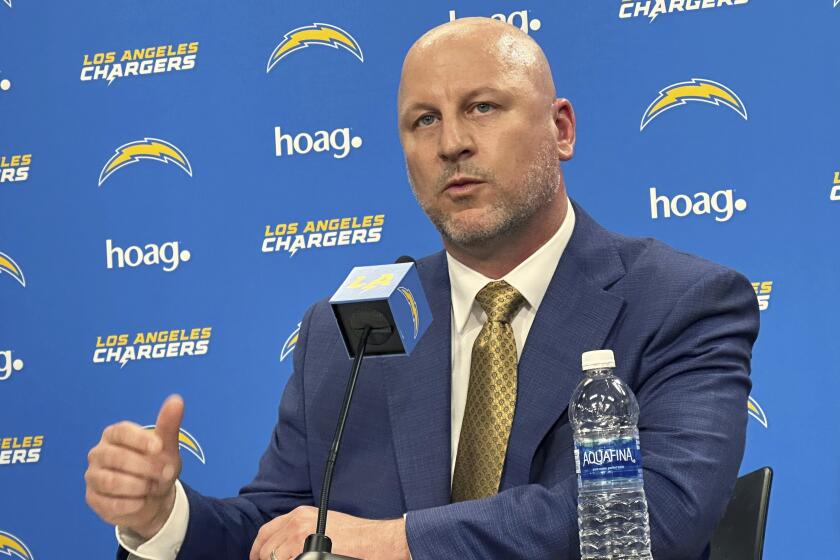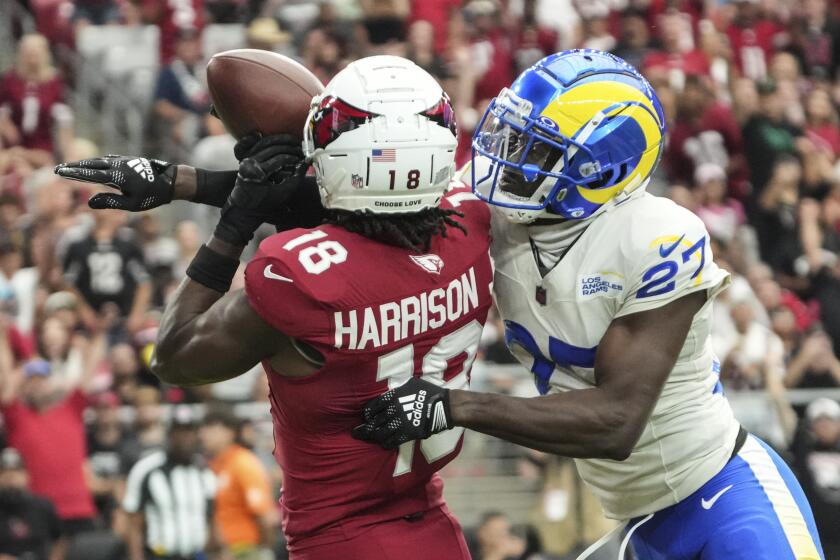Bidder on Dodgers asks about naming rights to Dodger Stadium
At least one party bidding on the Dodgers has inquired about the possibility of selling naming rights to Dodger Stadium, according to records filed this week in U.S. Bankruptcy Court.
Dodger Stadium turns 50 this year. The iconic ballpark has never been known by another name.
However, with the Dodgers expected to sell for a record price for a North American sports franchise, the investment bank brokering the sale has included naming rights among what it calls the “value creation opportunities” — that is, money-making options — for a buyer, according to two people familiar with the sale process.
Bruce Bennett, the Dodgers’ lead bankruptcy attorney, and Peter Cohen, the Blackstone Advisory Partners executive leading the sale team, discussed “naming rights and other bidder questions” in a telephone conference Feb. 22, according to court records.
It is uncertain whether the inquiries came from bidders still in contention and whether the questions reflected standard due diligence or a sincere interest in selling the Dodger Stadium naming rights. Dodgers spokeswoman Lyndsey Estin declined to comment.
The current bids for the Dodgers are believed to be in the range of $1.3 billion to $1.5 billion. The cost to renovate Dodger Stadium could run at least $200 million, according to people familiar with the sale process.
In 2006, the New York Mets sold the naming rights to Citi Field for $400 million — a record for a major league team — but the market has cooled since then. The Texas Rangers, the two-time defending American League champions, do not have a corporate name atop their ballpark. Neither do the Miami Marlins, even for the grand opening of their stadium this year.
In 2003, as Frank McCourt completed his purchase of the Dodgers, his business plan included the sale of naming rights.
“The Dodgers’ ability to remain competitive will rely in part upon the development of this revenue stream,” read the plan, revealed during his 2010 divorce trial. “A well thought out naming rights deal presented in this context will be accepted by the Los Angeles market.”
McCourt did not sell the naming rights to Dodger Stadium, but he received interest from several corporations, according to people familiar with the team’s sale process.
David Carter, executive director of the USC Sports Business Institute, said a new owner would be wise to at least consider a naming rights deal but wiser still not to make any immediate move in that direction.
“You have to list that as part of your marketing inventory, but it would never be the first club out of the bag for a new owner, because of the sensitivity,” Carter said.
“A new owner is not going to want to come in and trample over the brand he is trying to restore.”
Bob Wagner, who negotiated naming rights for the Angels and Ducks, said the tradition forged over half a century at Dodger Stadium might complicate efforts of a corporation to impose its name upon fans.
“You can say, ‘XYZ Co.’ They’re all going to say ‘Dodger Stadium,’ ” said Wagner, vice president at Cedar Fair Entertainment Co.
Wagner said a team can find plenty of other opportunities for corporate sponsorship, and indeed the Dodgers last season had stadium clubs sponsored by Prime Ticket, United Airlines and San Manuel Indian Bingo and Casino.
The Angels played at Anaheim Stadium from 1966 to 1997, before the Walt Disney Co. sold naming rights to Southern California Edison.
“How does it harm you as a fan? It doesn’t,” Tony Tavares, then Disney Sports president, said at the time. “We’ve got to try to tap every source of revenue we can to keep these seats affordable.”
Edison Field ceased to exist after the 2003 season, when the company canceled the deal. Arte Moreno, who had just bought the team from Disney, did not pursue another deal and opted to call the ballpark Angel Stadium.
“He’s not selling the naming rights,” Wagner said, “because he sees the value of the brand.”
twitter.com/BillShaikin
More to Read
Go beyond the scoreboard
Get the latest on L.A.'s teams in the daily Sports Report newsletter.
You may occasionally receive promotional content from the Los Angeles Times.











